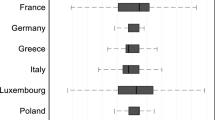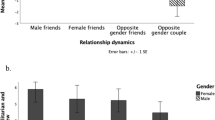Abstract
In this paper the division of household labour between partners is analyzed, based on data of the International Social Justice Project of 1990. We compare the results of four countries: Japan, Russia, The Netherlands, and the USA. Explanations for the division of housework may be found in economic and sociological theories. We first provide a short description of these theories. Then the theories are confronted with the data, using ordered response models. Our analysis leads to the conclusion that in The Netherlands and the USA economic variables have a significant effect on the division of houswork, but this is not (yet) the case in Japan and Russia. Next we analyze the perception of justice in the division of housework. First we formulate theories that could tell us when a distribution would be called fair. An equal distribution of paid and unpaid labour is considered very fair by the majority of the Russian, Dutch and American men and women, but not by the Japanese population. According to the Japanese fairness increases if the wives do all the housework and the husbands have a fulltime paid job.
Similar content being viewed by others
REFERENCES
Arts, W. and P. van Wijck, 1991, 'De keuze van rechtvaardigheidsbeginselen: consensus of dissensus?, ' Mens en Maatschappij, 66, pp. 65-84.
Becker, G.S., 1981, A Treatise of the Family, Cambridge, Harvard University Press.
England, P. and G. Farkas, 1986, Households, Employment and Gender: A Social, Economic and Demographic View, New York, Aldine.
Giele, J.Z., 1977, 'United States: A Prelonged Search for Equal Rights,' in: J.Z. Giele and A.C. Smock (eds.), Women, Roles and Status in Eight Countries, New York, John Wiley and Sons.
Haar, J. ter, 1972, De geschiedenis van Rusland, Bussum, Unieboek.
Heckman, J., 1979, 'Sample Selection Bias as a Specification Error,' Econometrics, 47, pp. 153-161.
International Social Justice Project, 1993, Codebook and Documentation, Institute for Social Research, University of Michigan, Ann Arbor.
Jasso, G. and P.H. Rossi, 1977, 'Distributive Justice and Earned Incomes,' American Sociological Review, 42, pp. 639-651.
Jasso, G., 1978, 'On the Justice of Earnings: A New Specification of the Justice Evaluation Function,' American Journal of Sociology, 83, pp. 1398-1419.
Kahneman, D. and A. Tversky, 1979, 'Prospect Theory: An Analysis of Decision under Risk,' Econo-metrics, 47, pp. 263-291.
Maddala, G.S., 1983, Limited-Dependent and Qualitative Variables in Econometrics, Cambridge, Cambridge University Press.
Maddison, A., 1982, Ontwikkelingsfasen van het kapitalisme, Utrecht, Spectrum.
Manser, M. and M. Brown, 1980, 'Marriage and Household Decision-making: A Bargaining Analysis, ' International Econometric Review, 21, pp. 31-44.
O.E.C.D., 1995, 'Historical Statistics,' Paris, O.E.C.D.
Peterson, G.W. and B.C. Rollins, 1987, 'Parent-Child Socialization,' in: M.B. Sussman and S.K. Steinmetz (eds.), Handbook of Marriage and the Family, New York, Plenum Press.
Pharr, S.J., 1977, 'Japan: Historical and Contemporary Perspectives,' in: J.Z. Giele and A.C. Smock (eds.), Women, Roles and Status in Eight Countries, New York, John Wiley and Sons.
Author information
Authors and Affiliations
Rights and permissions
About this article
Cite this article
Wunderink, S., Niehoff, M. Division of household labour: Facts and judgements. De Economist 145, 399–419 (1997). https://doi.org/10.1023/A:1003024732314
Issue Date:
DOI: https://doi.org/10.1023/A:1003024732314




